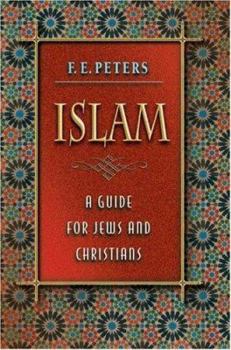Islam: A Guide for Jews and Christians
Select Format
Select Condition 
Book Overview
Entering Islam through the same biblical door Muhammad did, this book introduces readers with Christian or Jewish backgrounds to one of the world's largest, most active, and--in the West--least understood religions.
Format:Hardcover
Language:English
ISBN:0691115532
ISBN13:9780691115535
Release Date:April 2003
Publisher:Princeton University Press
Length:328 Pages
Weight:1.40 lbs.
Dimensions:9.5" x 1.0" x 6.5"
Customer Reviews
2 ratings
Highly Recommended!
Published by Thriftbooks.com User , 22 years ago
F. E. Peters should be respected as a writer and thinker willing to journey across perilous ground. He has spent most of his life and career writing and teaching about the three great Middle Eastern religions: Islam, Judaism and Christianity. Trying to be objective about three religions that often have been locked in mortal rivalry is hardly a safe route to the destination of political correctness. Perhaps the most valuable thing about Peters' book is that it is essentially non-polemical: it does not appear to reflect any particular religious point of view. Certainly, it is very well researched. Peters sheds a wealth of light on conflicts that are central to the events unfolding on the world stage, although he focuses more on historical development than on contemporary issues. While the degree to which objective analysis can accurately or successfully explain the conflicting passions of contrasting religious faiths remains questionable, Peters deserves credit for this impressive achievement. In part due to the critical nature of the issues that he addresses, we give his work a high recommendation.
An excellent study in comparative religion focused on Islam.
Published by Thriftbooks.com User , 22 years ago
This is an excellent book that will educate you on the foundation of Islam. It describes the colorful life of its prophet, Muhammad. He was unique in many ways. He was a warrior and army chief commander. He did not promote denial of earthly pleasures, as he is known to have had 13 wives and many concubines. His revelations captured in the Quran recommends that one be limited to four wives. These facts leave you baffled regarding the Muslims current views on the West as being so depraved and amoral. The book provides an excellent study in comparative religion between the three monotheist religions: Christianity, Judaism, and Islam. It is striking how similar these three religions are. It actually is difficult to differentiate them. Their respective differences rely on a set of technicalities that only a professor in theology would capture and remember. One exception to this is one difference anyone can readily get. Islam was polygamist. Meanwhile, the other two religions were and still are monogamist. This difference must have had an impact on women's status within Muslim societies. This book is a work of history, it is not a treaty in political science. Thus, it does not explain the current situation where Islam is exerting itself through violent means (terrorism), intolerance for any other religion, and hatred of the West. It also does not explain the current violent tension between the Shiites and Sunnis, even though it clearly outlines their differences. Shiites believe the leader of Islam should be part of Muhammad's blood lineage, while Sunnis believe Islam leaders should be elected.To further your understanding of Islam from both a historical and political science perspective, I recommend the many books written on this subject by Bernard Lewis.






